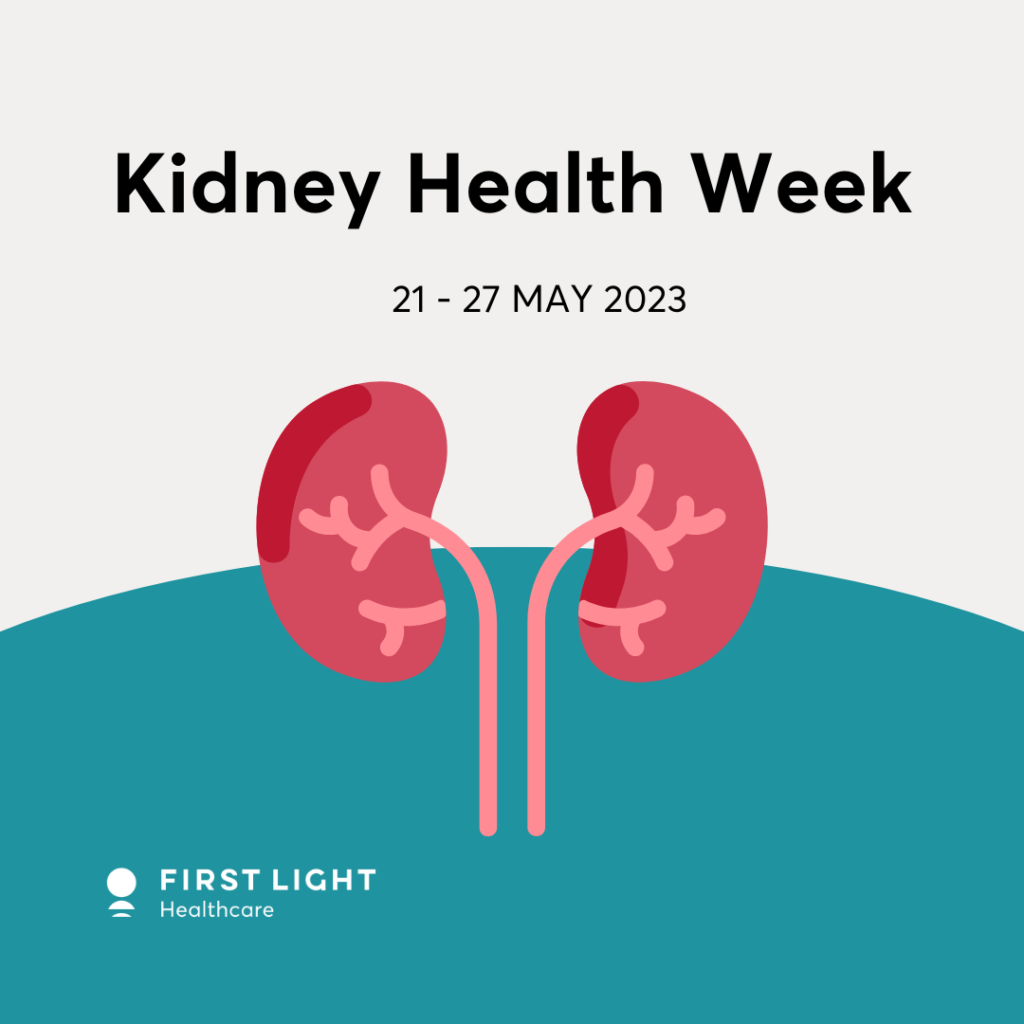Kidney Health Week

More than 500,000 Australians consult their doctors about kidney disease and urinary tract infections every year. More concerning is one in three Australian adults are at risk of developing chronic kidney disease, and one in ten Australians exhibit some sign of chronic kidney disease.*
Over a lifetime, one in three women and one in 10 men will suffer a bladder infection. Additionally, one in 35 women and one in 10 men will have kidney stones. *
Put simply, our kidneys are the unsung working heroes of our bodies as they perform a range of vitally important jobs in maintaining our overall health. Our kidneys control our blood pressure, they clean our blood creating urine, and they also manage the production of Vitamin D.
What is Kidney Disease?
Our kidneys are two, fist-sized bean-shaped organs that are invaluable to our good health with our kidneys acting as the body’s waste filtration system. Impressively, our kidneys filter our blood 12 times per hour with excess water, unwanted chemicals and waste in the blood then disposed of as urine. Kidney disease occurs when our kidneys are damaged and are not filtering our blood as effectively as they should.
What are the Symptoms of Kidney Disease?
Often called the ‘silent disease’, kidney disease can often present few or no symptoms at first even when they are not working as they should. The reason why kidney disease is called the silent disease is that you can lose up to 90 per cent of your kidneys’ function before experiencing any noticeable symptoms.
Some Signs and Symptoms of Kidney Disease Include:
- A change in the frequency and quantity of urine you pass, especially at night (usually an increase of urinating initially)
- The presence of blood in your urine (known as haematuria)
- Any changes in your urine, especially a foamy appearance
- The presence of puffiness around your legs and ankles (called oedema)
- Experiencing pain in your back – this generally located under the lower ribs, where the kidneys are located
- Any pain or burning when you pass urine
- High blood pressure
If your kidneys begin to fail, waste products and extra fluid build-up in your blood. This, and other problems, gradually leads to:
- A general feeling of being unwell
- Tiredness and inability to concentrate
- A loss of appetite
- Nausea and vomiting
- Shortness of breath
- Itching, especially the on legs, buttocks and arms
- Bad breath and a metallic taste in the mouth
What are the Risk Factors for Kidney Disease?
You are greater risk of developing chronic kidney disease if the following apply:
- You have high blood pressure
- You have diabetes
- You have heart problems such as a previous heart failure or heart attack, or you have had a stroke
- You are obese
- You are age over 60 years
- You have a family history of kidney failure
- You are a smoker
- You have a history of acute kidney injury
- You are of Aboriginal or Torres Strait Islander origin
High Blood Pressure and Kidney Disease
High blood pressure (known as hypertension) is increased pressure inside the arteries that carry blood from your heart to all parts of your body. If left untreated, high blood pressure can eventually damage your kidneys.
Additionally, high blood pressure can develop as a result of kidney disease or renal artery stenosis (the narrowing of the main artery to one or both of your kidneys). Your kidneys also control the amount of fluid in your blood vessels and produce a hormone called renin that helps to control blood pressure.
Diabetes and Kidney Disease
It is estimated that about 20 to 30 per cent of people with diabetes develop a type of kidney disease that is called diabetic nephropathy. This is a serious disease that may worsen other diabetic complications such as nerve and eye damage, as well as increasing the risk of cardiovascular (heart) disease.
Diabetic nephropathy is the main cause of kidney failure. This is also referred to as ‘end-stage kidney disease’ or ESKD. *
Kidney Disease and Cardiovascular Disease
Cardiovascular disease is the most common cause of death in people with chronic kidney disease. Compared to the general population, people with ongoing kidney disease are two to three times more likely to have cardiovascular (heart and blood vessel) problems.
This increased risk is partly caused by factors common to both chronic kidney disease and cardiovascular disease, especially if you have high blood pressure. Researchers are now discovering that chronic kidney disease is an important risk factor for the development of cardiovascular disease. A history of cardiovascular disease in turn, is also a risk factor for the development of chronic kidney disease.
Kidney Disease can Cause the Following Cardiovascular Risks:
- Heart attack
- Angina
- Stroke
- Heart failure
How is Kidney Disease Diagnosed?
Early diagnosis and optimal management can help to prevent any kidney damage from becoming worse and can reduces the risk of kidney failure. As outlined previously, kidney disease often displays few, if any symptoms other than a general sense of tiredness, headaches and feeling nauseous, making it important for you to monitor your general health and to visit your doctor if you feel any of these general symptoms of ill health.
In the first instance, typically, your doctor will review your medical history and perform a physical examination to determine kidney disease. The types of tests your doctor may undertake will depend on your symptoms, your age, medical history, lifestyle and general health.
Types of Tests for Kidney Disease Include:
- Urine tests
- Blood pressure test
- Blood tests
- Imaging
- A kidney biopsy
Urine Tests for Kidney Disease
If your kidneys are damaged or inflamed, they may produce substances such as blood or protein into your urine. The test for detecting protein in the urine is known as a ACR Urine test. This test will detect the amount of albumin (a type of protein) in the urine.
If you have diabetes, consistently high blood pressure or you are at risk of other factors for kidney disease, then your doctor may request a regular ACR Urine test every two years.
Blood Tests for Kidney Disease
The best measure of kidney function is the Glomerular Filtration Rate (GFR), which can be estimated from a blood test that checks the blood for creatinine – a waste product made by muscle tissue. *
Blood tests can reveal other abnormalities of kidney function, such as:
- High levels of acids (acidosis)
- Anaemia (insufficient red blood cells or haemoglobin, the protein in our red blood cells that transports oxygen)
- High levels of potassium (hyperkalaemia)
- Low levels of salt (hyponatraemia)
- Changes to the levels of calcium and phosphate
Imaging Tests for Kidney Disease
Tests that create various pictures or images of your kidneys may include:*
- X-rays – to check the size of the kidneys and look for kidney stones
- Cystogram – a specific X-ray of the bladder
- Voiding cystourethrogram – where the bladder is X-rayed before and after urination
- Ultrasound – this is when sound waves are ‘bounced’ off the kidneys to create a picture and can be used to check the size of the kidneys, detect kidney stones and any blood vessel blockages that may be visible on ultrasound
- Computed tomography (CT) – X-rays and digital computer technology are used to create an image of the urinary tract, including the kidneys
- Magnetic resonance imaging (MRI) – a strong magnetic field and radio waves are used to create a three-dimensional image of the urinary tract, including the kidneys.
- Radionuclide scan
Biopsy for Kidney Disease
A biopsy means that a small piece of tissue is taken for testing in a laboratory. Biopsies used in the investigation of kidney disease may include:
- Kidney biopsy – the doctor inserts a special needle into the back, under local anaesthesia, to obtain a small sample of kidney tissue. A kidney biopsy can confirm a diagnosis of chronic kidney disease.
- Bladder biopsy – the doctor inserts a thin tube (cystoscope) into the bladder via the urethra. This allows the doctor to view the inside of the bladder and check for abnormalities. This procedure is called a cystoscopy. The doctor may take a biopsy of bladder tissue for examination in a laboratory.
What are the Treatments for Kidney Disease?
Kidney disease can be slowed and sometimes even prevented if detected early enough. In the early stages, changes to diet and medication can help to increase the life and efficiency of your kidneys.
For those with kidney function that is reduced to less than 10 per cent of normal kidney health, this loss of function will need to be replaced by dialysis or a kidney transplant. Dialysis is a treatment for kidney failure that removes waste products and extra water from the blood by filtering it through a fine membrane filter.
Prevention of Kidney Disease
It’s important to keep your kidneys healthy so they can perform the important tasks they are designed for throughout your life. If your kidneys are not healthy, other organs in your body may suffer that can lead to further health complications. Medication and changes to your lifestyle, along with a referral to a kidney specialist can prevent or delay kidney failure.
Heathy Choices for Healthy Kidneys
It’s important to take care of your overall health – and this includes taking care of your kidneys. Things you can do include to protect your kidneys from disease include:**
- Having your blood pressure checked regularly and ensuring it stays below the levels recommended by your doctor. If you do have high blood pressure, there is a range of medications that can work to help regulate your blood pressure to a healthy level.
- Monitoring your blood glucose levels if you have diabetes to ensure that you stay within a healthy range.
- Leading an active, healthy lifestyle and maintaining a healthy weight.
- Eating lots of fruit and vegetables including legumes (such as beans) and grain-based food including wholemeal bread, pasta, noodles and rice.
- Avoid fatty meats and eat lean meat such as chicken and fish each week.
- Eat only small amounts of salty or fatty foods.
- Drink plenty of water instead of sugary soft drinks and fruit juices.
- Stay fit by doing at least 30 minutes of physical activity that increases your heart rate at least five days a week. These activities can include walking, lawn mowing, bike riding, swimming, gentle aerobics or yoga.
- If you smoke, quit. Speak to your doctor for tips and available resources to help you with quitting for life.
- Limit your alcohol to no more than two small drinks per day if you are male, or one small drink per day if you are female.
- Do things that help you to relax and reduce your stress levels such as meditation.
Where to Get Support:
Kidney Health Australia
* https://kidney.org.au/your-kidneys/know-your-kidneys/keeping-your-kidneys-healthy
Sources:
*https://www.betterhealth.vic.gov.au/health/conditionsandtreatments/kidney-disease#bhc-content ** https://kidney.org.au/your-kidneys/know-your-kidneys/keeping-your-kidneys-healthy
By Tracey Hordern
Reviewed by the First Light Healthcare team


